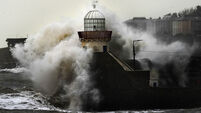Fearless entrepreneur with fire in his belly
A tax exile living in Portugal, the multi-millionaire claims to have nearly gone bust on several occasions during his extraordinary rise to the top.
A former personal assistant to GPA aircraft leasing group founder Tony Ryan, some of his earlier investments, such as a partnership in a shopping channel on Sky TV, did turn sour.













